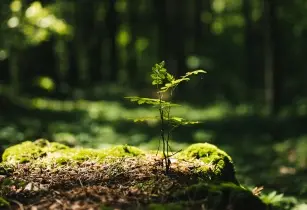The BaCaSi project is an ambitious partnership between TotalEnergies, Forêt Ressources Management, a French company, with its Congolese subsidiary Forest Neutral Congo (FNC) and the Republic of the Congo
It is a pioneering partnership based on improved local farming and forestry serving an integrated development and the climate action. The purpose is the sustainable development of an area of 55,000 ha, including the conservation of remaining patches of forest, the planting of 38,000 ha over 10 years and 2,000 ha of agroforestry schemes managed with the local communities.
The project will last 35 years, to reflect the pace of agriculture and the growth of trees. It will benefit the partners and local population in a sustainable way while capturing CO2.
An assessment is underway to finalise the mapping of stakeholders and to propose and implement the measures that will allow them to be co-beneficiaries of the project. In addition to mechanisms, such as access to farmland and machinery, the project will offer them a stake in the agroforestry value chain, allowing them to enjoy the benefits of the region’s new socio-economic development.
TotalEnergies’ ambition is to implement international standards that will exceed local legal requirements.
Land
The BaCaSi project area is a 55,000 ha area within the Programme National d’Afforestation (ProNar) launched by the Republic of the Congo in 2011.
In 2014, ProNar agents carried out a first field mission to identify an area of approximately 70,000 ha.
This was followed by a second mission in 2020 with the Ministère de l’Économie Forestière and the Ministère des Affaires Foncières et du Domaine Public to liaise and investigate with the local authorities to define the specific borders of the 70,000 ha area.
Following this mission, this land – which was owned by the state – was converted from the state’s public domain to private domain with the view to changing the management of the area and leasing these 70,000 ha to FNC by decree of 18 September 2020 (published in the Congolese legal gazette on 1 October 2020) pursuant to the Code du Domaine de l’État. The land was not requisitioned, as it had belonged and still belongs to the state.
The Congolese government held a ceremony in November 2021 (cérémonie du franc symbolique) to mark the launch of the project, including the change to the right of use and the consequent socio-economic development of the area. The development of the BaCaSi project will also take customary rights of use into account.
Congo Forest Company (CFC), a Congolese affiliate of TotalEnergies, sub-leased 55,000 ha from FNC for a 35 year-term, with the intent to implement sustainable management, including the planting of 38,000 ha.
Partnership
TENBS, CFC, FNC and the Republic of the Congo entered into a partnership agreement on 12 March 2021, with a view to implementing the BaCaSi project. This agreement was approved by the Congolese Parliament and Senate and published in the legal Gazette on 24 March 2022.
Stakeholders
In March 2022, TENBS and FNC launched an assessment to identify the project’s potential impacts and mitigate negative impacts that could not be reduced. This will establish a complete picture of those who are affected by the project in the overall project area (55,000 ha) and will identify a remediation action plan, including livelihood restoration measures that comply with international standards. Results will be complete and made public in 2023.
All manioc fields on the site have remained untouched and all the stakeholders historically present on the site are being identified and will be offered alternatives for future farming rotations, including prepared lands or other appropriate remediation to be defined with them.
Co-benefits
In the short to medium term, the project will produce significant social co-benefits through several mechanisms. These include direct and indirect job creation in the area, with the hiring of team leaders, seasonal workers, engineers and technicians. Employment opportunities will provide for the strong involvement of women and indigenous populations in operations.
The project will also foster farming practices that are well known in the neighboring part of the Bateke Plateaux by launching a 2,000 ha acacia/manioc agroforestry system in partnership with local farmers. This will improve the manioc yield and produce alternative sustainable wood fuel for local use (replacing wood fuel from deforestation).
This project also aims at eventually supplying Brazzaville and Kinshasa with plywood and sawn wood.
It also includes a local development fund dedicated to the local communities, financing social projects in nutrition, health, and education. The development fund is being designed and will be launched in the coming months in line with the project plan.









